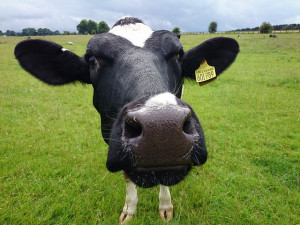Centre for Environmetnal Strategy Research Fellow Dr Liz York discusses the horsemeat scandal and why it caused such a stir:

“Peaceful Coexistence” : Giorgio Galeotti Licence: CC BY 2.0
Food incidents occur on a regular basis – you need only to look at the UK’s Food Standards Agency food alert system or the US food bulletins to realise that consumers are under constant threat of ingesting harmful foodstuffs. So why did a harmless food item that is consumed in other countries cause such an upset in the UK?
The substitution of horsemeat for beef and pork was initially found in Dec 2012 by the Food Safety Authority of Ireland, who on 15th January 2013, informed 5 UK retailers of the positive results. The media led with the story the very next day focusing on a test of a single ‘beef’ burger, which showed that it consisted of 29% equine DNA. The media stories ran from this point like a deluge, as consumers returned products due to the growing list of those incorrectly labelled. Some of the larger retailers, such as Morrisons and Waitrose, fared better than most others, as they quickly and efficiently proved that they knew the source of their products, and so were not affected. As people continued to boycott numerous beef products from unverified sources, the net slowly closed in on the source of the contamination, identifying those responsible.

“Now This is a Meat Counter” : Phil Denton Licence: CC BY-SA 2.0
Current supply chains are complex multi-layered networks which interlink numerous products and companies. This made the tracing of the products difficult and longwinded as information needed to be gathered not only from within the UK and Ireland but also from Poland, France, Luxemburg, Cyprus, Netherlands and Romania.
Unfortunately for the food industry, a second wave of media reporting added health issues to the situation as there was a possibility that horsemeat contaminated by phenlybutazone could be entering the supply chain. The FSA immediately started testing for phenylbutazone and it was detected once in April 2013. However due to the low concentration, it did not constitute a health risk.
So why did the Horsemeat Scandal make such a splash in the headlines? The simple answer is ‘deception’. Consumers in the UK felt deceived. There are many things that human nature struggles to cope with and deception is the one of these, whether it be cancelling an engagement to meet someone else or unwittingly buying bootleg electronics. As a species we like to be given the truth, whilst knowing what we buy is genuine. This is especially important in the case of food which can, literally, be a matter of life or death. So the general public disliked the idea that what was stated on the labels did not match the product, whether horsemeat is safe to eat or not. While many consumers said they would not mind trying horse, they objected to eating horsemeat unknowingly.

“Breakfast x Brunch” : Jonathan Lin Licence: CC BY-SA 2.0
I think one of the most worrying things about this scandal is the distance of consumers from their food and from the supply chain. Due to the lengthening of supply chains, imports and the wish for cheap food and ready meals, consumers are left open to manipulation. In years gone by a butcher would buy from a farmer, and sell to the consumer, creating a level of social responsibility, a face behind the meat. Nowadays you can buy from a supermarket and talk to no one, meat can pass through brokers who see no products, and move across borders with different regulations. During the horsemeat crisis local butchers experienced an upsurge in their businesses and though this has subsequently dropped, many still have increased trade.
Deception and adulteration of products does not always illicit this response. The horsemeat scandal also saw the substitution of beef and pork for each other: this produced a larger problem than horse for certain sectors of the community who hold religious beliefs or are unable to eat one of the products. However only later did the media publish this angle.
In February 2015 the UK was hit with the adulteration of paprika and cumin with almonds and peanuts. This had massive health implications for those with almond and peanut allergens. But it did not have the same impact or media coverage as the horsemeat substitution, even though the potential implications for vulnerable members of the community were severe.
Much of the time the cause of food adulteration is economy driven. For example, the cumin substitution was thought to be due to the bad harvest of cumin in the preceding months, causing the cost of cumin to skyrocket. Therefore to meet demand of low cost food, something needed to give – and honesty and consumer trust were the victims.
So what can be done to restore the reputation of the food industry and increase consumer confidence? The Government commissioned a review into the integrity and assurance of the food supply network, led by Professor Christopher Elliott. Prof Elliott worked with industry stakeholders to produce 8 recommendations, that, implemented in conjunction altogether, would create a more robust and resilient system. Many of the recommendations have already been implemented or are scheduled to be.

“Cow with no Body” : Steven Zolneczko Licence: CC BY-SA 2.0
The food industry has had to evolve quickly to cope with this scandal and subsequent changes, but is it enough? What impact will these changes have on the food industry in the longer term? Will the new more linked, over-arching regulatory system serve its purpose? Will this new system stop adulteration of food?
The answer is no, never. The first food law, Assize of Bread, was created by King John of England in 1202 to stop the substitution of flour in bread. Criminals will always find a new way to take advantage of the system, with no thought to the harm they might cause. But now with a more secure, connected and traceable system, and the constant vigilance of those in the industry, we can hope their impact will become negligible.
